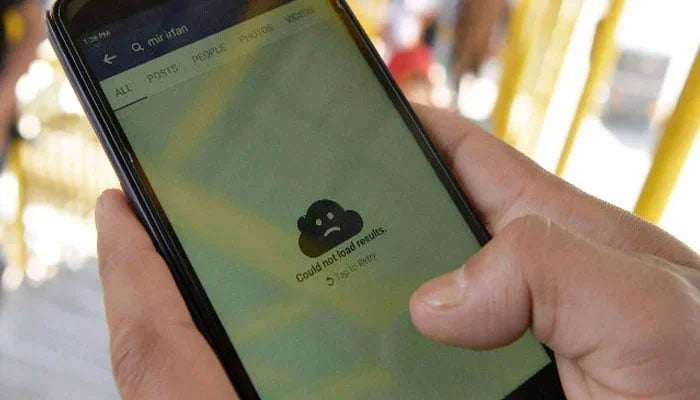Buffering...
According to WISPAP nation’s internet speed has nosedived by a staggering 30-40 per cent
Welcome to Pakistan, where internet ‘speed’ has become the latest oxymoron. If you’re finding yourself stuck in an endless buffering loop, fret not; you’re not alone. According to the Wireless and Internet Service Providers Association of Pakistan (WISPAP), the nation’s internet speed has nosedived by a staggering 30-40 per cent. That’s not just a speed bump; it’s a full-on roadblock. If the internet were any slower, we’d be using carrier pigeons. The root of this digital debacle seems to be increased security and surveillance measures. Imagine a firewall so comprehensive it turns the internet into a digital sloth. WISPAP has linked the speed issues to increased security and surveillance whose aftermath might result in severe economic consequences as well. By many accounts, the government’s alleged ‘trial run’ of this firewall has morphed into a nightmare for e-commerce and online businesses whose very survival could be at stake. Meanwhile, the nation’s WhatsApp users are suffering from painfully slow uploads and downloads.
Prime Minister Shehbaz Sharif-led coalition government and the Pakistan Telecommunication Authority (PTA) have remained quiet as millions across the country continue to face trouble accessing internet services due to limited connectivity, particularly while using mobile data in some regions. Not only that, government ministers have not only acknowledged that a firewall trial is going on in the country but also defended it as a cyber security measure that every government in the world takes. This is a claim that has been debunked by digital rights experts in Pakistan who say that firewalls are essentially a form of pre-censorship that should have no place in any democracy.
In this day and age, it is amazing to see the government talking about web management systems and firewalls. When a government – a democratically elected one – starts to justify censorship, that should be a cause of concern for the country’s citizens because it essentially means the government does not believe in freedom of speech and expression. This is 2024 – the internet is not some novelty luxury but a fundamental need. It seems though that the state would rather have us sitting in caves around bonfires, what with a slow WhatsApp, a ban on X (formerly Twitter), and even blackouts at times. In a democracy, the internet is not disrupted. In a democracy, freedom of expression is guaranteed with limitations on incitement to violence and hate speech. However, while we do not take any action against hate speech or incitement to violence, we are quick to ban social media platforms and slow down the internet because the state does not have any counter-narrative to fake news or propaganda. So what exactly is the government’s big plan to save ‘Digital Pakistan’? A start could be to stop treating the internet like a nuisance and start seeing it as a vital economic artery. If Pakistan continues down this path of digital doom, it might find itself more isolated than a dial-up user in a fiber-optic world.
-
 Andrew, Sarah Ferguson Refuse King Charles Request: 'Raising Eyebrows Inside Palace'
Andrew, Sarah Ferguson Refuse King Charles Request: 'Raising Eyebrows Inside Palace' -
 Adam Sandler Reveals How Tom Cruise Introduced Him To Paul Thomas Anderson
Adam Sandler Reveals How Tom Cruise Introduced Him To Paul Thomas Anderson -
 Washington Post CEO William Lewis Resigns After Sweeping Layoffs
Washington Post CEO William Lewis Resigns After Sweeping Layoffs -
 North Korea To Hold 9th Workers’ Party Congress In Late February
North Korea To Hold 9th Workers’ Party Congress In Late February -
 All You Need To Know Guide To Rosacea
All You Need To Know Guide To Rosacea -
 Princess Diana's Brother 'handed Over' Althorp House To Marion And Her Family
Princess Diana's Brother 'handed Over' Althorp House To Marion And Her Family -
 Trump Mobile T1 Phone Resurfaces With New Specs, Higher Price
Trump Mobile T1 Phone Resurfaces With New Specs, Higher Price -
 Factory Explosion In North China Leaves Eight Dead
Factory Explosion In North China Leaves Eight Dead -
 Blac Chyna Opens Up About Her Kids: ‘Disturb Their Inner Child'
Blac Chyna Opens Up About Her Kids: ‘Disturb Their Inner Child' -
 Winter Olympics 2026: Milan Protestors Rally Against The Games As Environmentally, Economically ‘unsustainable’
Winter Olympics 2026: Milan Protestors Rally Against The Games As Environmentally, Economically ‘unsustainable’ -
 How Long Is The Super Bowl? Average Game Time And Halftime Show Explained
How Long Is The Super Bowl? Average Game Time And Halftime Show Explained -
 Natasha Bure Makes Stunning Confession About Her Marriage To Bradley Steven Perry
Natasha Bure Makes Stunning Confession About Her Marriage To Bradley Steven Perry -
 ChatGPT Caricature Prompts Are Going Viral. Here’s List You Must Try
ChatGPT Caricature Prompts Are Going Viral. Here’s List You Must Try -
 James Pearce Jr. Arrested In Florida After Alleged Domestic Dispute, Falcons Respond
James Pearce Jr. Arrested In Florida After Alleged Domestic Dispute, Falcons Respond -
 Cavaliers Vs Kings: James Harden Shines Late In Cleveland Debut Win
Cavaliers Vs Kings: James Harden Shines Late In Cleveland Debut Win -
 2026 Winter Olympics Snowboarding: Su Yiming Wins Bronze And Completes Medal Set
2026 Winter Olympics Snowboarding: Su Yiming Wins Bronze And Completes Medal Set




